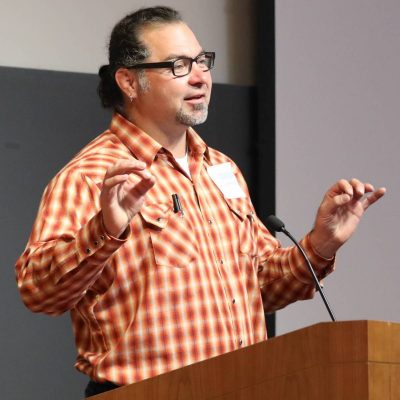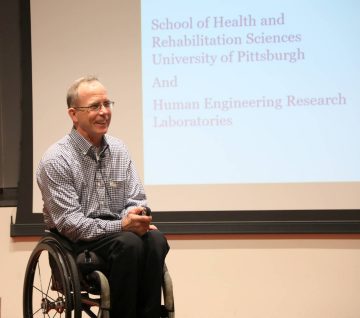‘A Better Chance of Providing Access’: Future Professors Institute Fosters Inclusivity

Dr. Sweeney Windchief. Photo by Roger William Photography.
By Katya Hrichak
Making graduate school a more welcoming environment for all was the topic of both Drs. Sweeney Windchief’s and Rory Cooper’s keynote talks during the Future Professors Institute on June 20. Addressing culturally-aware mentoring and accessible research environments, the speakers encouraged the graduate students, postdoctoral scholars, and faculty in attendance to broaden their viewpoints to best support their future students.
Dr. Sweeney Windchief of the Fort Peck Assiniboine Tribe, associate professor of adult and higher education at Montana State University, discussed best practices for tailoring mentoring to benefit individual students rather than generalizing practices for a group.
During his talk, “Culturally Attuned Mentoring Paradigms – Relationships in Community Context,” Windchief reflected on the most and least successful mentoring practices for American Indian and Alaska Native graduate students in STEM fields and how these concepts could be applied to other student groups.
“There were a couple of things that didn’t work. Traditional mentoring didn’t necessarily work with the life ways, with the worldviews of our students,” he said.
Instead, he found that when mentors got to know their individual students and learned about their backgrounds, the mentoring relationships grew stronger and more effective.
“They wanted their mentors to at least understand that they had a different worldview and they were still able to operate in the academy,” Windchief said. “If we all think about how we can do this from our own positions, we have a better chance of providing access for those students.”

For those with physical disabilities, simply being able to use lab equipment can be a barrier to access in the academy. In his talk, “Advancing Inclusive Research and Education Environments,” Dr. Rory Cooper, the associate dean for inclusion in the School of Health and Rehabilitation Sciences and FISA/Paralyzed Veterans of America Distinguished Professor at the University of Pittsburgh, discussed how his lab is successfully accommodating students of all abilities.
“You can advance technology in a more relevant way and at a faster pace by being diverse and including people with all types of experiences and of gender, race, and ability statuses,” he said. “We’re trying to set a model for other scientific and engineering labs to see how we can all work together.”
The researchers in Cooper’s lab represent many facets of the population and various forms of abilities, and work to create technology that will make the world more accessible to all. Two examples he shared with the audience included wheelchairs that could climb curbs and air-powered wheelchairs that allowed mobility-limited children to enjoy a waterpark designed for those with disabilities.
“What I think is exciting about [your interest in these issues] is you’re going to go out and be successful, great new faculty at institutions across the United States, across the world, and change this,” he said to attendees. “You’re going to be culturally aware, and you’re going to come in and you’ll make opportunities.”
Dean of the Graduate School Barbara A. Knuth echoed similar sentiments while addressing the graduate students and postdoctoral scholars in attendance.
“Your interest in advancing diversity and inclusion in the academy is very much appreciated,” she said. “Only by all of us working together on these very tough issues will we make progress in improving the higher education landscape.”
The Future Professors Institute is co-sponsored by the Graduate School Office of Inclusion and Student Engagement, the Center for the Integration of Research, Teaching, and Learning (CIRTL) at Cornell, and the Office of Postdoctoral Studies with partial support from NSF Grant No. 1647094.
Katya Hrichak is a communications assistant in the Graduate School.
